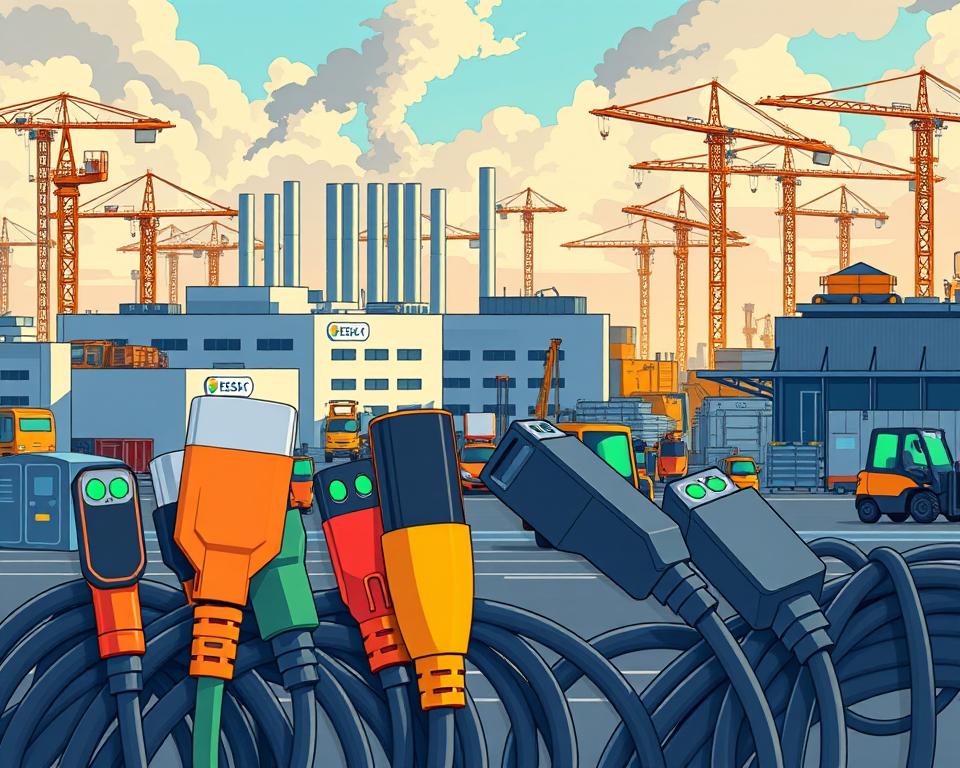Leading EV Charging Cable Manufacturers for Your EV
The EV market is expanding rapidly, with the demand for dependable and high-performance charging solutions growing exponentially. Currently, industry leaders have been at the vanguard of this change, providing high-quality charging infrastructure. Southwire, for instance, entered the market in 2014 and excels, garnering 1000+ five-star reviews and a 75-year legacy in electrical construction.
The rise in electric vehicle adoption drives demand for long-lasting, rapid, and secure Charger Manufacturers in China. Key suppliers are pioneering to meet these evolving needs, offering solutions that boost the overall charging experience.
Grasping the distinctions between various charging solutions is essential for making informed decisions. High-grade charging infrastructure directly impacts vehicle performance and customer satisfaction.
Essential Insights
- Key suppliers deliver top-tier cables enhancing lifespan and protection.
- Growing EV adoption fuels demand for fast, reliable infrastructure.
- Industry leaders develop cutting-edge products for EV drivers.
- High-grade cables improve energy transfer and driving range.
- Investing in quality charging infrastructure is beneficial in the long run.

The Critical Role of Premium EV Charging Cables
As more drivers choose EVs, the importance of high-quality EV charging cables is undeniable. The efficiency, security, and reliability of electric vehicle charging systems depend heavily on the quality of the charging cables used.
How EV Charging Tech Has Advanced
Charging tech for EVs has evolved rapidly, with a shift toward speedy charge times and improved safety features. Today’s EV charging cables are designed to meet these evolving needs, incorporating superior materials and construction techniques to minimize energy waste and maximize charging efficiency.
Why Quality Matters in EV Charging Infrastructure
Premium cables enhance both safety and functionality in EV systems. Robustness, such as weather resistance and flexibility in extreme temperatures, ensure reliable operation across various environments. Moreover, meeting standards and following protocols are crucial in ensuring that cables meet rigorous safety requirements.
| Key Features | Benefits |
|---|---|
| High-grade build quality | Reduced energy waste |
| Enhanced durability features | Weather resistance, flexibility in extreme temperatures |
| Standards adherence | Rigorous safety requirements met |
| Maintainability | Long-term value proposition, reduced waste |
Aichie Tech Electronics’ premium cables undergo rigorous testing at The Cable Lab. With repairable Portable EV Charger Manufacturer, users can save hundreds over a decade by choosing repairs over replacements, reducing waste and protecting the planet.
China’s Leading EV Cable Makers
A surge of cable makers in China supports the EV boom. These companies are crucial in supporting the expanding electric vehicle (EV) market, providing high-quality automotive cables designed for different applications.
Wottz: Industry Leaders Since 2014
Wottz has established itself as a prominent player in the EV charging cable market since 2014. They offer a range of cables that cover Mode 1–4 charging standards, from Mode 1, 2, 3, and fast-charging Mode 4 DC Charging.
Aichie Tech Electronics – 75 Years in Electrical Solutions
Aichie Tech Electronics leverages 75 years of electrical expertise in its EV cables. Their products are built for residential and commercial applications.
Additional Key Cable Suppliers
Specialists in Type 1/Type 2 connectors and environmental-resistant cables are emerging players. These include specialists in Type 1 (J1772) and Type 2 (Mennekes) connectors, as well as brands innovating in cable durability and adaptability.
A Guide to EV Cable Types
As electric vehicles become increasingly popular, understanding the various types of EV Charging Cable Manufacturers is crucial for optimal charging experiences. Knowing cable types ensures you pick the right charger. The variety in EV charging infrastructure demands a closer look at the cable options.
Comparing SAE J1772 and Mennekes Cables
SAE J1772 (Type 1) and Mennekes (Type 2) are the main global standards. Type 1, also known as SAE J1772, is predominantly used in North America, while Type 2, or Mennekes, is the standard in Europe. The right cable matches your car and charger. Type 2 cables often handle greater power, making them suitable for faster charging.
Level2 and DC Fast Charging Solutions
Level2 charging cables offer faster charging than Level1, using 240V AC power to deliver up to 19.2 kW of power. DC Fast Charging cables, on the other hand, provide rapid charging by converting AC power to DC within the charging station, allowing for much faster charging times. These cables are essential for long-distance EV travel, letting EVs charge in minutes.
Granny Chargers vs Tethered Units
Portable EV charging cables, such as “Granny chargers,” offer flexibility by allowing owners to charge their vehicles from standard household outlets. Tethered cables are attached permanently, providing a convenient but less flexible charging solution. The choice depends on the owner’s charging needs and preferences.
Cable length, power rating, and connector type matter most. For instance, portable charging cables range from simple L1 cords to full L2 kits. Vehicle-to-load (V2L) cables represent an emerging category, enabling EVs to power external devices.
- Flexible granny chargers and L2 units suit various needs.
- Tethered cables are permanently attached to charging stations, limiting flexibility but eliminating the need for personal cables.
- Cable length is a critical consideration, with options ranging from 5-meter standard cables to 50-meter extended cables.
Key Features of High-Quality EV Charging Cables
Premium cables stand out for durability, safety, and performance. These features are crucial for maintaining the integrity of the charging process and safeguarding the vehicle and user.
Robustness and Weatherproofing
Durability and weather resistance are paramount in EV charging cables. Manufacturers like Wottz and Southwire use RoHS-compliant recyclable compounds, ensuring they withstand various environmental conditions. Their serviceable design facilitates easy maintenance and promotes recycling.
Maneuverability and Convenience
Cables need to flex yet remain tough. High-quality EV charging cables are designed to be flexible, making them easier to handle and maneuver. This flexibility does not compromise their durability, as they are built to withstand regular use.
Certified Safety and Standards
Approved safety marks ensure reliable performance. They ensure their products meet or exceed standards such as IEC62196 for connectors and UL2594 in North America. Independent labs verify safety, toughness, and weatherproofing.
| Certification | Description | Region |
|---|---|---|
| IEC62196 | Connector safety standards | International |
| UL2594 | Standard for electric vehicle supply equipment | North America |
| ROHS | Restriction of hazardous substances | International |
Emphasizing these attributes yields cables that are safe, durable, and user-friendly.
Next-Gen Charging Cable Tech
New cable tech is transforming EV charging, with a focus on speed, reliable data transfer, and sustainable compounds.
Thermal-Managed Fast Charging
Cooling fluids enable higher charge rates, enabling electric vehicles to charge at significantly higher speeds without overheating.
Hyperboloid Contacts and Enhanced Signal Integrity
Hyperboloid contact points improve electrical connection, ensuring reliable and efficient data transfer during the charging process.
Eco-Friendly Cable Compounds
Companies focus on green materials, using recyclable materials and eco-friendly compounds that reduce environmental impact. For instance, companies like Aichie Tech Electronics and Wottz are adopting serviceable design philosophies and RoHS compliance to minimize waste and promote recycling.
Programs for cable recycling, non-toxic compounds, and TPU sheaths mark the eco shift.
Buyer’s Guide to EV Charging Cables
Selecting the proper cable ensures optimal performance. To make an informed decision, consider several key factors.
Compatibility with Your Electric Vehicle Model
Ensure the charging cable is compatible with your vehicle’s connector type. Your vehicle’s onboard charger capacity sets the upper limit for AC power.
Length Considerations
Choose a cable length that suits your charging needs. A longer cable adds reach at the cost of extra weight.
Matching Power and Speed
Ensure cable amperage aligns with charger and car. Standard Level 2 home charging operates at 7.2 kW, but some vehicles support up to 19.2 kW with appropriate electrical service.
By considering these factors, you can select an EV charging cable that meets your needs and enhances your overall charging experience.
Conclusion: Investing in Quality EV Charging Infrastructure
As the electric vehicle market continues to expand, the importance of quality charging infrastructure cannot be overstated. Choosing cables from Wottz or Aichie Tech Electronics provides long-term value and reliability. Their serviceable designs allow for component replacement, reducing waste and costs. This approach supports eco-friendly EV use.
Premium cables offer certification, future proofing, and reliability.
